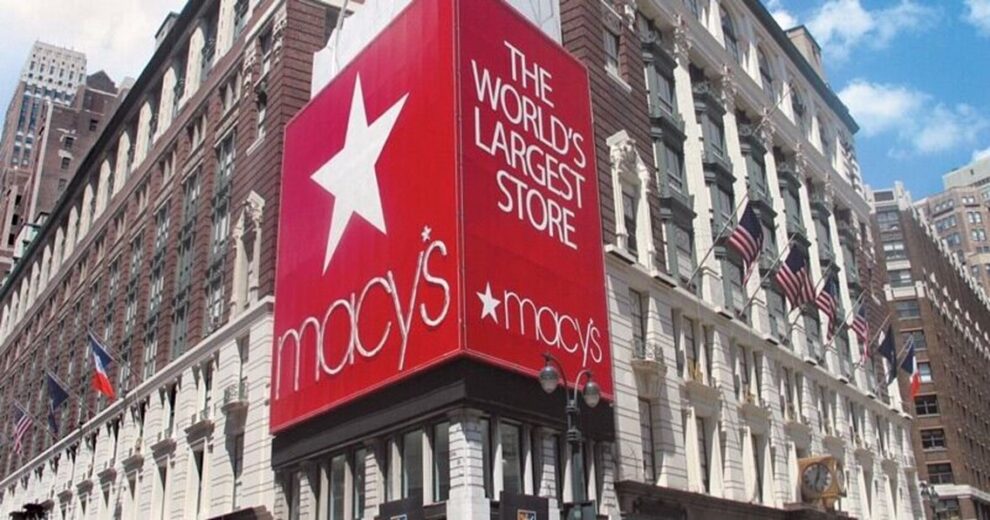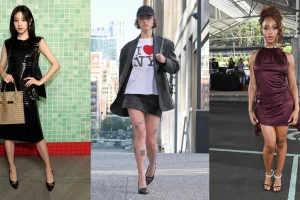UD student research helps Macy’s create positive change in fashion industry
When leaders of the sustainability and sourcing teams at Macy’s, Inc. wanted to know how using more recycled materials in clothing would impact their strategies for obtaining their products, six University of Delaware fashion and apparel students helped provide the answer.
Two weeks after graduating from UD, Ally Botwinick, Kallista Kuhn, Lara Wood, Leah Marsh, Miriam Keegan and Taylor Ferrara presented the results of a comprehensive investigation into the crucial factors that can help the company incorporate more recycled content fibers into its private brands to Macy’s executives at the company’s flagship store in New York City.
Under the guidance of Sheng Lu, associate professor and director of graduate studies in the Department of Fashion and Apparel Studies, the former students collaborated with leaders at Macy’s in sustainability, sourcing, product development, raw materials and design. The research aimed to identify the challenges and opportunities associated with the company’s shift toward a more sustainable future. By focusing on expanding the use of recycled content in Macy’s private brands, the work reflects a shared commitment by both UD and Macy’s to drive positive change in the fashion industry.
“We are excited to partner with Macy’s, a leading company in the apparel retail business that is dedicated to innovative solutions for more sustainable operations,” Lu said.
Sustainability is an important but complex issue for the fashion industry, according to Lu. Industry reports predict the market for clothing with recycled materials could grow into a $16 billion annual business globally by 2032. Meeting that demand requires companies to examine both environmental and social responsibility factors when creating plans to become more sustainable. Supply chain, manufacturing processes, pricing, public policy, labor standards, consumer education and more all need to be considered.
In 2022, Macy’s introduced Mission Every One, the company’s social purpose platform to create a brighter future with bold representation for all. Mission Every One builds on the company’s heritage of corporate citizenship and directs $5 billion through 2025, to the partners, products, people and programs that help create a more equitable and sustainable future. Through the program Macy’s engages resources and leverages its talent and scale to embed Mission Every One into its business strategy, creating an essential framework for business that serves as a filter for decision making for all colleagues.

Laurie Rando, senior director of sustainable product and human rights for Macy’s, Inc., played an integral role in the partnership with UD. She was impressed by the graduates’ preparedness and professionalism. “We think this is the beginning of something that is really fabulous going forward as you are obviously our future,” Rando told the group.
Within this work, the company aims to embed sustainability across its global operations, anchored on two commitments of caring for the people making its products and managing its environmental impact. Among its many goals, Macy’s has set goals to achieve 100% preferred materials in its private brand products managed by the Macy’s sourcing team by 2030. As its products come from hundreds of vendors around the world, the team said sourcing strategy will play a central role in achieving that goal.
The UD researchers focused their project on three different types of apparel: denim, activewear and women’s tops. Findings combined qualitative information from interviews with Macy’s executives and policymakers from the U.S. Trade Association with quantitative data about current products.

Recent graduates of UD’s fashion and apparel studies program present their findings to Macy’s, Inc. executives. From left, Taylor Ferrara, Lara Wood, Ally Botwinick, Leah Marsh, Kallista Kuhn and Miriam Keegan.
The research provided valuable insights into the challenges and opportunities found in a sustainability journey. While the results varied for each category, the overall conclusions showed opportunities for Macy’s to meet its goals by diversifying sourcing markets to different countries, and identified challenges surrounding costs, supply chain tracking and trade policy.
“The findings from this project will be directly beneficial to my team’s work in Macy’s private brands,” said Angela Katsios, Macy’s vice president of strategic sourcing and operations. “As we continue to evolve and learn, we also work closely with our colleagues at Bloomingdale’s to incorporate learnings into operations across our business.”

UD alumna Lara Wood experiments with techniques to make denim look worn in the denim studio at Macy’s, Inc. in New York City. Denim was one of three apparel types included in the UD research.
Laurie Rando, senior director of sustainable product and human rights for Macy’s, played an integral role in both the partnership with UD, as well as the creation of the company’s Mission Every One goals. She was impressed by the graduates’ preparedness and professionalism.
“We think this is the beginning of something that is really fabulous going forward as you are obviously our future,” Rando told the group.
UD alumna Lara Wood said, “I was terribly nervous. But it was such good practice and such a good experience. It was nice to see the executives were so accessible. We were able to talk with them one on one and have a conversation with them.”
The presentation was one part of a full day that included sessions on careers, communication skills, a networking lunch with several Macy’s UD alumni and tours of both Macy’s denim studio and its material library, which contains fabrics that have been used and some the company is exploring for the future. A behind-the-scenes tour of the flagship store in New York’s Herald Square capped off the day.
“I feel like all the people we’ve spoken to, you can tell they are really committed,” Ferrara said. “They’re very authentic. They’re not just saying we want to be sustainable, they’re actually taking action.”
About the research
The idea for the project began in the summer of 2021, when Ally Botwinick was an undergraduate working with Lu as a summer research scholar. Botwinick was a student in the department’s 4+1 master’s program, and the project expanded to become the thesis project for her graduate degree.

The students and faculty adviser Sheng Lu learned about the environmental impact of denim clothing from Macy’s senior wash engineer Alfredo Jimenez during a tour of the denim studio.
Macy’s set up in-depth interviews with the students and members of its sourcing, product development, and sustainability teams to outline the store’s vision and operations in supply chain, sustainability and other related areas. The former students also met with the assistant U. S. trade representative for textiles, the highest-ranking trade policymaker for the textile sector, to understand policymakers’ perspective on encouraging more sustainable apparel trade and related policy issues, such as tariffs and environmental provisions in US trade agreements.
They also examined thousands of apparel items made from recycled materials that Macy’s currently sells to learn variations in sourcing, pricing and the assortment of products.
The team members represented various backgrounds within fashion and apparel studies — apparel design, product development, sourcing, sustainability, supply chain and merchandising. The diverse viewpoints enhanced the project. “It turned out to be a great success as real-world challenges like sustainability and climate change are complex and require interdisciplinary collaboration,” Lu said.
This is not the first time UD students have worked with the retailer.
“Dr. Lu has been a great partner for so many years,” Rando said. “I knew the caliber of work he could do and I thought this is a great place to start this new initiative.”
The industry’s future will include the continued development of sustainable practices and products. When asked if having recycled materials in clothing is important to them as the next generation of industry leaders, and as consumers, the graduates’ answer was a resounding and collective yes.
“We’ve grown up with fast fashion at our fingertips,” Kuhn said. “Now, we’re seeing the effect it’s having on the environment, and we want to do better.”
Source : UDaily






















